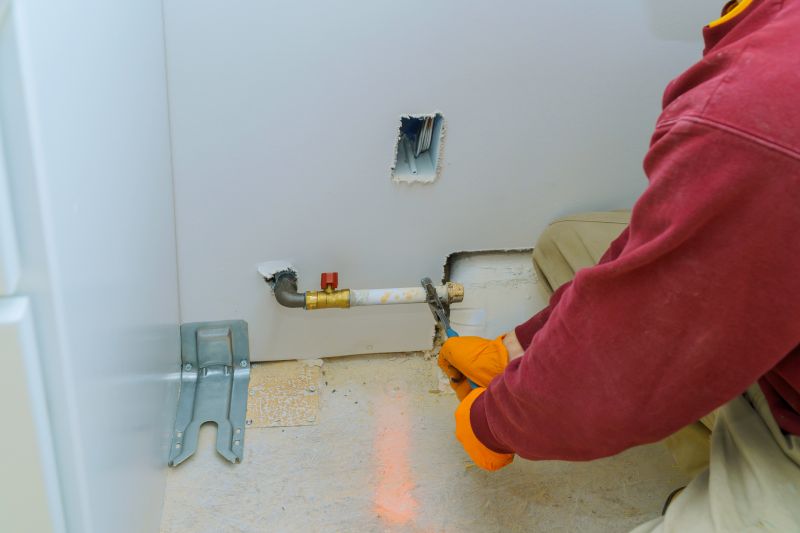Top-Rated Gas Line Capping Options for Versatile Plumbing Applications
Browse through high-performance gas line caps suitable for residential, commercial, and industrial piping systems.
 Gas line cappings are essential components used to seal off unused or temporary gas line openings, ensuring safety and preventing leaks. These fittings come in a variety of materials and designs to accommodate different pipe sizes and types, including steel, brass, and plastic options. Proper selection and installation of gas line caps are crucial for maintaining system integrity, especially during maintenance, repairs, or when decommissioning unused lines.
Gas line cappings are essential components used to seal off unused or temporary gas line openings, ensuring safety and preventing leaks. These fittings come in a variety of materials and designs to accommodate different pipe sizes and types, including steel, brass, and plastic options. Proper selection and installation of gas line caps are crucial for maintaining system integrity, especially during maintenance, repairs, or when decommissioning unused lines.
Top Overall Option
Universal Gas Line Cap
The universal gas line cap offers a versatile solution compatible with a range of pipe sizes and materials. Designed for easy installation and reliable sealing, it is suitable for both temporary and permanent applications. Its durable construction ensures resistance to corrosion and environmental wear, making it a dependable choice for maintaining safety in gas piping systems.
Types of Products For Gas Line Cappings
Threaded Gas Line Caps
Designed to screw onto threaded pipe ends, providing a secure and tight seal for various pipe sizes.
Compression Fittings
Use compression mechanisms to seal off pipes without threading, suitable for quick installations.
Push-to-Connect Caps
Allow for easy connection and disconnection with push-fit designs, ideal for temporary closures.
Plastic Gas Line Caps
Made from durable plastics, these caps are lightweight and resistant to corrosion, suitable for low-pressure applications.
Brass Gas Line Caps
Known for strength and corrosion resistance, ideal for outdoor or high-pressure environments.
Steel Gas Line Caps
Heavy-duty caps designed for industrial applications requiring high durability.
Flanged Gas Line Caps
Features flanged edges for secure bolting onto pipe flanges, used in larger pipeline systems.
Quick-Connect Caps
Facilitate rapid connection and disconnection, often used in maintenance scenarios.
Gas Line Plug Caps
Solid plugs that seal off pipe ends, often used for temporary closures.
Adjustable Gas Line Caps
Caps with adjustable fittings to accommodate varying pipe sizes and configurations.
Locking Gas Line Caps
Designed with locking mechanisms to prevent accidental removal or tampering.
Reusable Gas Line Caps
Capable of multiple installations and removals without degradation of sealing performance.
Popular Choices
Widely used for their durability and compatibility with various piping systems.
Favored for ease of installation and suitability for low-pressure applications.
Common in industrial settings for their strength and secure sealing capabilities.
Popular for quick, reliable sealing without the need for threading.
Chosen for their versatility and long-term usability in various systems.
Preferred for rapid setup and disassembly in maintenance tasks.
Selected for security features in sensitive or high-risk environments.
Useful for applications requiring adaptable fitting options.
Commonly used during system testing or repair phases.
Ideal for large-scale piping systems needing secure flange connections.
Suitable for residential or low-pressure gas line closures.
Designed to withstand outdoor conditions and moisture exposure.
When choosing a gas line cap, considerations such as compatibility with existing piping, material durability, and ease of installation are important. Some caps are designed for quick attachment and removal, making them suitable for temporary applications, while others are intended for permanent sealing. Ensuring the cap's specifications match the gas type and pressure ratings of the system is vital for safety and compliance with local codes.
Quality gas line caps are manufactured to withstand environmental factors such as corrosion, temperature fluctuations, and physical impact. They often feature secure sealing mechanisms like threaded connections, compression fittings, or push-to-connect designs. Properly fitted caps help prevent gas leaks, contamination, and accidental disconnections, contributing to overall system safety.
Whether for residential, commercial, or industrial use, selecting the right gas line cap involves understanding the specific requirements of your gas piping system. Consulting with professionals or referring to manufacturer guidelines can aid in choosing the appropriate product. Regular inspection and maintenance of gas line caps are recommended to ensure ongoing safety and functionality.
Key Buying Considerations
- Compatibility with existing pipe sizes and types
- Material durability and resistance to environmental factors
- Sealing mechanism effectiveness and reliability
- Ease of installation and removal
- Pressure ratings suitable for your system
- Compliance with local safety standards and codes
- Temporary versus permanent sealing needs
- Corrosion resistance for outdoor or harsh environments
- Availability of different sizes and configurations
- Locking or tamper-proof features if security is a concern
- Reusability for cost efficiency
- Compatibility with gas type (natural gas, propane, etc.)
- Weight and ease of handling
- Cost and overall value for the application
- Manufacturer reputation and product reviews
This content contains affiliate links and we may earn a commission if you make a purchase through them.
